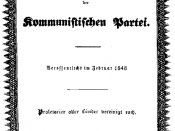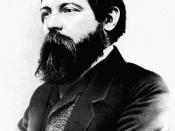For Rich or For Poor?
Since time began, there has been a never-ending struggle between people of different backgrounds. This includes differences such as race, social standing, and financial stability. Although the United States has spent the last two hundred years making sure that every American is treated equally and justly, these same struggles still occur today. In Richard Wright's novel, Native Son, he illustrates the conflicts between the rich and poor in 1930's Chicago and how communism could have changed the situation drastically.
Communism was a major issue and its central ideas play an important role in the novel itself. At the time, being involved with anything communist was viewed as an Un-American, disloyal act (Wright 66). However, the ideas favored by communism may have been the only thing that could save the story's main character, Bigger Thomas. Bigger was a character modeled after Wright himself. He was a poverty stricken black man who lived with his mother, sister, and younger brother in a one- room, run-down housing project.
Communist views lobbied for equal treatment for all people no matter of race or financial standing. Racial injustices, however, ran rampant in Chicago and the blacks didn't feel like they were getting fair treatment. Bigger felt that if he was white everything would be different and he could do so much more with his life (Wright 20). These were not uncommon thoughts for the black people of the era. There was still segregation in the schools, transportation, and other public facilities. This, combined with the racist propaganda that was impressed upon them, led to Bigger harboring an intense hatred not for the whites, but for the situation that he had been thrust into. Bigger explains his situation with this quote: "I reckon we the only things in this city...


